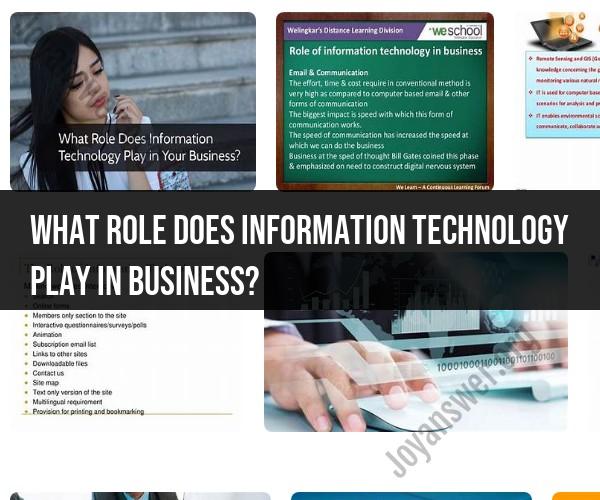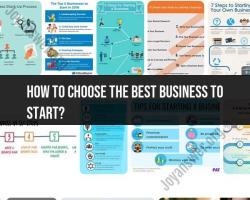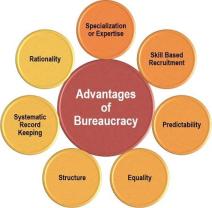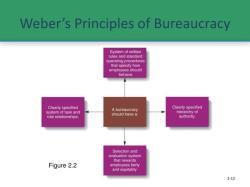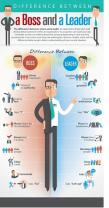What role does information technology play in business?
Information technology (IT) plays a crucial and multifaceted role in business, impacting nearly every aspect of modern organizations. Its role in business can be summarized as follows:
Efficiency and Automation: IT systems automate repetitive tasks, streamline business processes, and improve overall operational efficiency. This includes managing inventory, processing transactions, handling payroll, and more. Automation reduces human errors and frees up employees for more strategic tasks.
Data Management and Analysis: IT allows businesses to collect, store, and analyze vast amounts of data. This data-driven approach enables informed decision-making, market analysis, customer insights, and the identification of trends and opportunities.
Communication and Collaboration: IT facilitates communication within an organization and with external stakeholders. Email, video conferencing, instant messaging, and collaboration tools like Microsoft Teams and Slack enable teams to work together efficiently, even across geographical boundaries.
Customer Relationship Management (CRM): CRM software helps businesses manage and nurture customer relationships. It stores customer data, tracks interactions, and provides insights for personalized marketing and customer service, improving customer satisfaction and retention.
Marketing and E-commerce: IT is essential for digital marketing and e-commerce. Businesses use websites, social media, email marketing, and online advertising to reach and engage with customers. E-commerce platforms enable online sales and transactions.
Supply Chain Management: IT systems enhance supply chain visibility and coordination. Businesses can monitor inventory levels, track shipments, optimize routes, and manage suppliers more effectively, reducing costs and improving efficiency.
Financial Management: Accounting software and financial management systems help businesses manage budgets, track expenses, generate financial reports, and ensure compliance with tax regulations. This enhances financial transparency and accountability.
Security and Data Protection: Cybersecurity measures protect business data and systems from threats such as malware, hackers, and data breaches. Robust security practices and technologies are critical to safeguarding sensitive information.
Strategic Decision-Making: IT provides tools for scenario analysis, modeling, and simulation, aiding strategic decision-making. Business intelligence (BI) and data analytics tools help leaders make data-driven choices to stay competitive.
Globalization and Remote Work: IT enables organizations to expand their reach globally and tap into remote talent pools. Remote work solutions, cloud computing, and virtual private networks (VPNs) support a more flexible and geographically diverse workforce.
Customer Service: IT systems, including chatbots and customer service software, enhance the quality and accessibility of customer support. Businesses can provide 24/7 assistance and resolve customer issues more efficiently.
Innovation and Competitive Advantage: Businesses leverage IT for innovation, whether it's developing new products, services, or business models. Staying ahead of competitors often depends on technological innovation.
Compliance and Reporting: IT helps businesses comply with industry regulations and reporting requirements. Software tools can automate compliance checks and generate reports for auditing purposes.
In summary, information technology is integral to modern business operations, offering the potential to increase efficiency, improve decision-making, enhance customer experiences, and gain a competitive edge. It has become a strategic asset that organizations rely on to adapt to evolving market dynamics and remain relevant in today's digital economy.
Information Technology's Role in Business: A Comprehensive Overview
Information technology (IT) plays a vital role in businesses of all sizes and industries. IT can be used to improve efficiency, productivity, customer service, and profitability.
Some of the key ways that IT can be used in business include:
- Automating tasks: IT can be used to automate many routine tasks, such as data entry, accounting, and customer service. This can free up employees to focus on more strategic and creative work.
- Improving communication and collaboration: IT can be used to improve communication and collaboration between employees, customers, and partners. This can be done through email, video conferencing, and other online tools.
- Analyzing data: IT can be used to collect and analyze data from a variety of sources. This data can be used to improve decision-making, identify new opportunities, and track progress towards goals.
- Developing and delivering products and services: IT can be used to develop and deliver products and services to customers. This can be done through websites, e-commerce platforms, and mobile apps.
Leveraging IT for Success: The Impact on Modern Business
Businesses that leverage IT effectively can achieve a number of benefits, including:
- Increased efficiency and productivity: IT can help businesses to automate tasks, streamline processes, and improve communication and collaboration. This can lead to increased efficiency and productivity.
- Improved customer service: IT can be used to improve customer service by making it easier for customers to contact the business and get the help they need. IT can also be used to personalize the customer experience and provide customers with the information they need.
- Reduced costs: IT can help businesses to reduce costs by automating tasks, streamlining processes, and improving communication and collaboration. IT can also be used to reduce the need for physical space and resources.
- Increased sales and revenue: IT can be used to increase sales and revenue by developing and delivering new products and services to customers. IT can also be used to reach new markets and expand the customer base.
Business Transformation through Information Technology
IT can be used to transform businesses in a number of ways. For example, IT can be used to:
- Create new business models: IT can be used to create new business models, such as e-commerce and subscription-based services.
- Expand into new markets: IT can be used to expand into new markets by reaching customers online and selling products and services globally.
- Improve customer relationships: IT can be used to build stronger customer relationships by providing personalized service and support.
- Improve employee productivity and engagement: IT can be used to improve employee productivity and engagement by providing employees with the tools and resources they need to do their jobs effectively.
Examples of how businesses are using IT to achieve success:
- Amazon uses IT to automate its fulfillment process, which allows it to deliver products to customers quickly and efficiently.
- Netflix uses IT to personalize the customer experience by recommending movies and TV shows to customers based on their viewing history.
- Airbnb uses IT to connect travelers with hosts, which allows it to provide a unique and affordable accommodation experience.
These are just a few examples of how businesses are using IT to achieve success. IT can be a powerful tool for businesses of all sizes and industries, and it is essential for businesses that want to remain competitive in the global marketplace.
